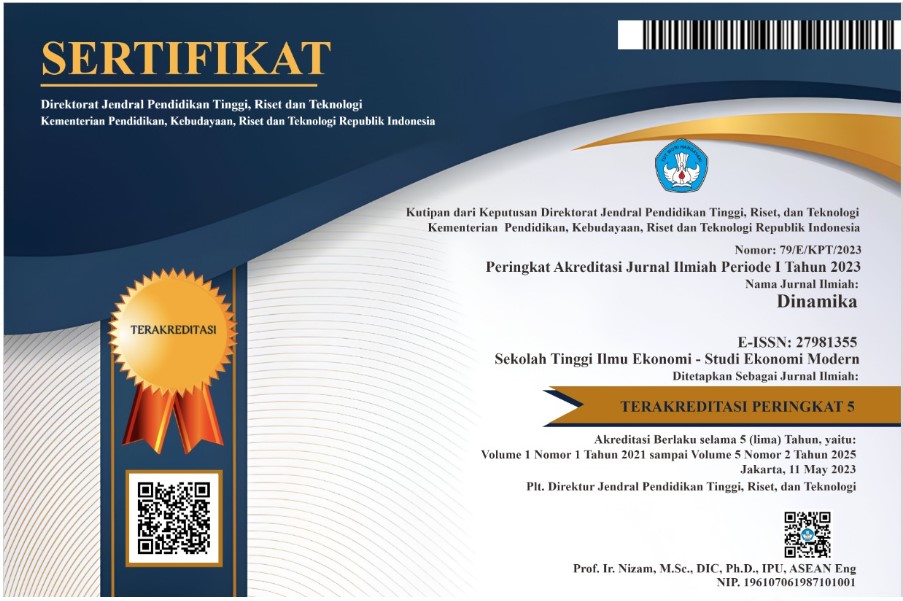PENGARUH DELEGASI, OTORITAS, TANGGUNG JAWAB TERHADAP KINERJA PEGAWAI
DOI:
https://doi.org/10.51903/dinamika.v4i1.418Keywords:
delegasi, otoritas, tanggung jawab, kinerja pegawai, manajemenAbstract
Employee performance plays an important role in the success and sustainability of the company. Effective management of employees is the key to achieving organizational goals, and factors affecting employee performance have become a major concern in human resource management. Although many studies have been conducted with respect to these factors, there are variations in results and findings. And those who study the factors of delegation, authority and responsibility for employee performance have not been many. So the title of this study is to study the Influence of Delegation, Authority, Responsibility on Employee Performance. This study uses a survey method of a sample of employees from various levels of hierarchy in Agency "X". The data collected is then analyzed using statistics i.e. by multiple regression analysis. The results showed that a higher level of delegation from superiors had a positive impact on employee performance. It was also found that clear authority and well-defined responsibilities contributed positively to employee performance. It can be concluded that the independent variables tested, namely delegation, authority, and responsibility, have a significant influence on the performance of employees in organization "X". Furthermore, policies and practices that support more effective and efficient management of human resources, including management training that understands the importance of delegation and the granting of appropriate authority, can be applied to the organization of "X" and other organizations.
References
[2] D. Dorce, F. I. Rukmana, D. Delimasari, and H. Madiistriyatno, ‘Penerapan Etika Manajemen Dan Tanggung Jawab Sosial Pegawai Kantor Otoritas Pelabuhan Utama Tanjung Priok Jakarta Utara’, Aliansi J. Manaj. dan Bisnis, vol. 18, no. 1, pp. 119–124, 2023, doi: 10.46975/aliansi.v18i1.474.
[3] R. Bayu Putra and H. Fitri, ‘Literature Review: Model Pengukuran Kinerja Dosen Dan Organizational Citezenship Behavior Berdasarkan Karakteristik Individu, Budaya Kerja Dan Perilaku Individu’, J. Ilmu Manaj. Terap., vol. 2, no. 4, pp. 485–512, 2021, doi: 10.31933/jimt.v2i4.447.
[4] R. Rosmaini and H. Tanjung, ‘Pengaruh Kompetensi, Motivasi Dan Kepuasan Kerja Terhadap Kinerja Pegawai’, Maneggio J. Ilm. Magister Manaj., vol. 2, no. 1, pp. 1–15, 2019, doi: 10.30596/maneggio.v2i1.3366.
[5] J. Jufrizen, S. Farisi, M. E. Azhar, and R. Daulay, ‘Model Empiris Organizational Citizenship Behavior Dan Kinerja Dosen Perguruan Tinggi Swasta Di Medan’, EKUITAS (Jurnal Ekon. dan Keuangan), vol. 4, no. 2, pp. 145–165, 2020, doi: 10.24034/j25485024.y2020.v4.i2.4159.
[6] R. Nuraisiah, ‘Pengaruh Intensitas Persaingan, Delegasi, Strategi Dan Perubahan Sistem Akuntansi Manajemen Terhadap Kinerja Organisasi’, Prog. J. Pendidikan, Akunt. dan Keuang., vol. 1, no. 1, pp. 111–135, 2018, doi: 10.47080/progress.v1i1.133.
[7] M. GANDARA, ‘Kewenangan Atribusi, Delegasi dan Mandat’, Khazanah Huk., vol. 2, no. 3, pp. 92–99, 2020, doi: 10.15575/kh.v2i3.8187.
[8] R. Sabuhari, A. Sudiro, D. W. Irawanto, and M. Rahayu, ‘The effects of human resource flexibility, employee competency, organizational culture adaptation and job satisfaction on employee performance’, Manag. Sci. Lett., vol. 10, no. 8, pp. 1777–1786, 2020, doi: 10.5267/j.msl.2020.1.001.
[9] L. L. Asi, A. Gani, and S. Sukmawati, ‘Pengaruh Budaya Organisasi, Motivasi Kerja, Lingkungan Kerja Terhadap Komitmen Organisasional Dan Kinerja Dosen Universitas Negeri Gorontalo’, J. Manag. Sci., vol. 2, no. 1, pp. 01–24, 2021, doi: 10.52103/jms.v2i1.295.
[10] A. O. Sougui, A. T. Bon, and H. M. H. Hassan, ‘The Impact of Leadership Styles on Employees’ performance in Telecom Engineering companies Related papers’, Aust. J. Basic Appl. Sci., vol. 7, no. 3, pp. 1–14, 2013.
[11] E. Tanjeen, ‘Employee Empowerment: A Critical Review’, Dhaka Univ. J. Manag., vol. 5, no. 1, 2013, [Online]. Available: https://www.researchgate.net/publication/343135373.
[12] L. Bonde, ‘the Effects of Grief and Loss on Decision Making in Hiv0Related’, no. August, pp. 83–98, 1999.
[13] H. M. K. Nanayakkara and Y. M. S. W. V. Sangarandeniya, ‘Employee Engagement through Corporate Social Responsibility: A Study of Executive and Managerial Level Employees of XYZ Company in Private Healthcare Services Sector’, Open J. Bus. Manag., vol. 10, no. 01, pp. 1–16, 2022, doi: 10.4236/ojbm.2022.101001.
[14] A. Muktamar B, ‘The role of ethical leadership in organizational culture’, J. Mantik, vol. 7, no. 1, pp. 77–85, 2023, doi: 10.35335/mantik.v7i1.3635.
Downloads
Published
Issue
Section
License
Copyright (c) 2024 Dinamika: Jurnal Manajemen Sosial Ekonomi

This work is licensed under a Creative Commons Attribution-ShareAlike 4.0 International License.












